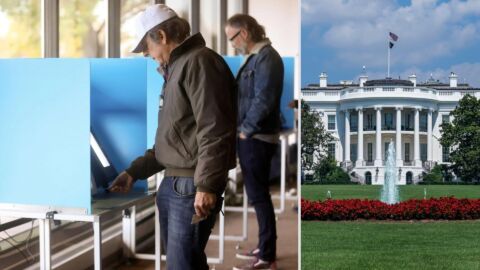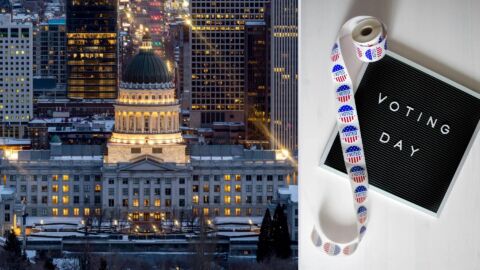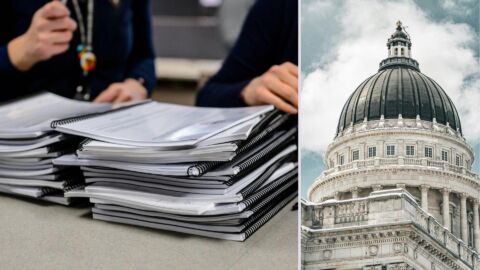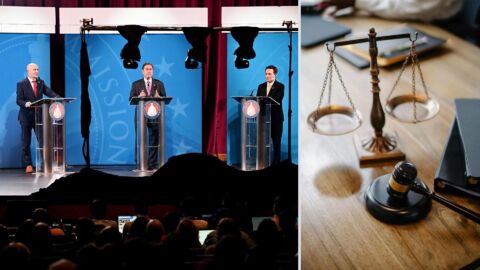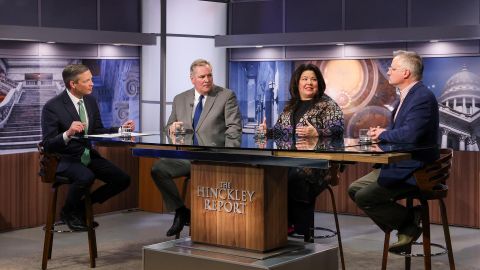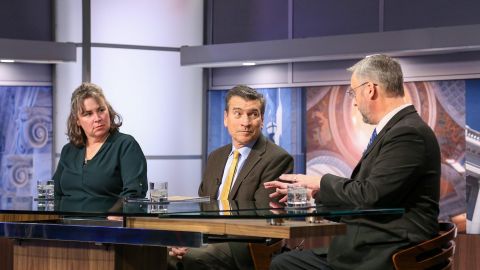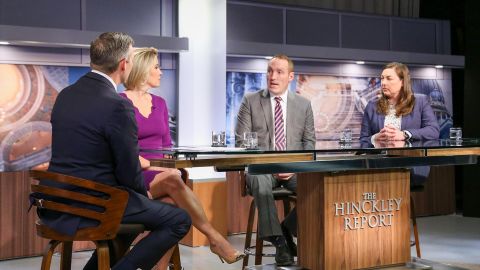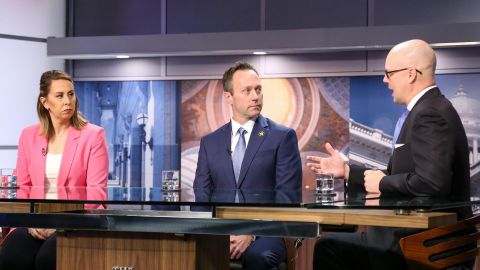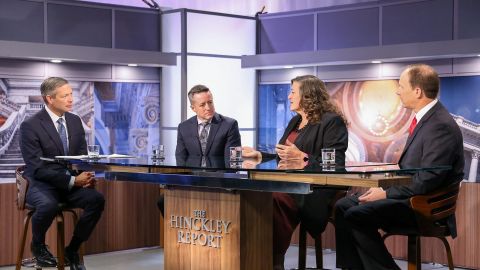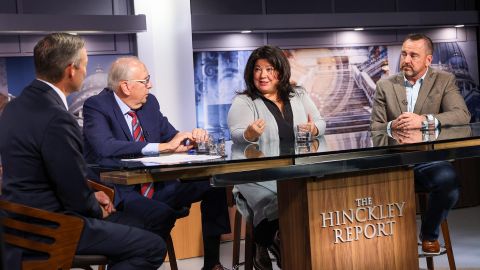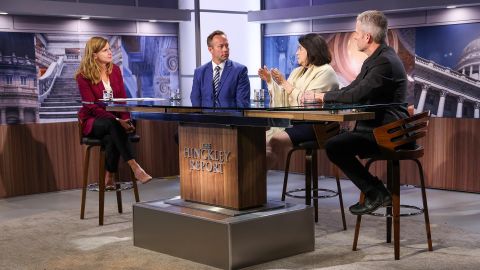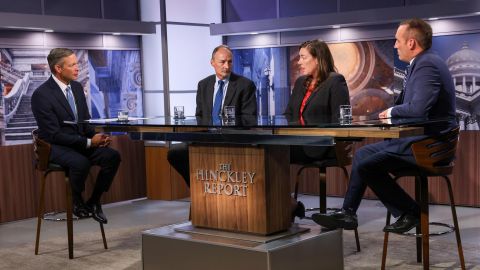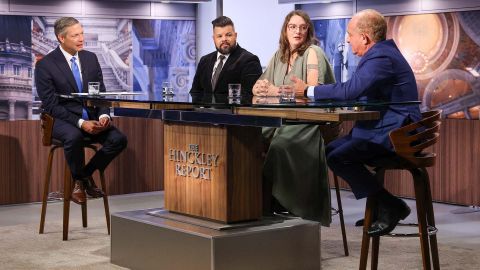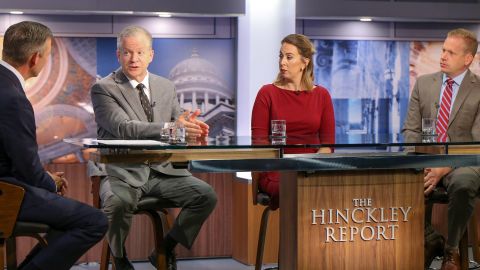♪♪♪♪♪ male announcer: Funding for "The Hinckley Report" is provided in part by the Cleone Peterson Eccles Foundation Fund, Merit Medical, and by contributions to PBS Utah from viewers like you.
Thank you.
Jason Perry: Tonight on "The Hinckley Report," former President Donald Trump touches down for a brief campaign stop in Utah, after a major ruling on Amendment D legislators regroup and strategize next steps.
And our panel discusses the rise in political violence, reflecting on what it means for our country.
♪♪♪♪♪ ♪♪♪♪♪ Jason: Good evening and welcome to "The Hinckley Report."
I'm Jason Perry, Director of the Hinckley Institute of Politics.
Covering the week, we have Daniel Woodruff, reporter with KSL-5 News; Heidi Hatch, anchor with KUTV-2 News; and Chris Bleak, partner with our RRJ Consulting.
So glad to have you with us this week on "The Hinckley Report."
A lot of issues to get to, but I wanna start with you, Daniel, on one that is of growing concern and very visible and that is about political violence in our country.
We're seeing a lot more it, two attempts on the life of former President Trump.
Talk about why we are seeing what seems to be an elevated level of tension and violence.
Daniel Woodruff: We're seeing it both nationally and here in Utah.
The numbers show that political violence and the threats of political violence are on the rise.
I think there are a number of things you could look at as to the reason for it.
But I think one thing that I've noticed over the last few years is that we have gone from talking about political opponents as merely opponents or people that we disagree with to evil, and folks that are trying to actively destroy the country.
And when you have that type of rhetoric, I don't think it's surprising that we see threats and violent incidents on the rise and we've seen it in this state and I think the numbers for 2024 are already staggering that we have had a large number of threats against elected officials and such, compared to previous years.
Jason: Well, I want to talk about that for a minute because this is just--on local, Heidi, that according to the Utah State Wide Information and Analysis Center, there is such a thing, 73 threat incidents towards Utah officials just this year.
Heidi Hatch: I think it's concerning and a lot with what Daniel said.
I just think that there's so much hate for the other candidate instead of love of country or love of the process or trying to get to the end goal of what you want, that people are just blinded by that.
And as a part of the media.
Sometimes I'm a little bit ashamed of the way that sometimes these are covered.
I think that we live in a world where we kind of downplay these or it turns into a quick joke or a meme.
But I think it's a serious issue and I think if we take it seriously, people will act accordingly.
But I just think that it's not being taken seriously.
And I think that's concerning.
I heard Democratic Senator Richard Blumenthal the other day after he came out of a Secret Service hearing, saying that if Americans knew what they had just heard in that hearing, that we would be shocked and appalled.
And I think that that shock and appall is what's missing where we're not really digging into the answers, figuring out where these problems come from, how do we fix them, and how to make it better.
And they sometimes just get brushed aside or we don't dig into them because maybe we don't want to know the answers.
And so, I just think we all need to try better to really look at where these problems are, how to solve them, and then how to have real conversation like we're having around the table right now instead of looking at someone as you know, evil, because that's how we look at other people who don't agree with us now.
Heidi: They're our neighbors.
Jason: Yeah, exactly.
I wanna get to the media part in a second but, Chris, talk about this from a political lens.
You've been involved in political scene in Utah for a very long time.
How did this become what seems like a zero sum game?
I guess it is what we just heard and as Daniel was just talking about where it's not just that we disagree, it's that you are my enemy.
Chris Bleak: Yeah, I remember taking history classes in high school and thinking, I'm glad I didn't grow up in the 60s, you know, there was such a history of political violence in our country generally, but specifically in that decade.
And now I'm thinking we're in--we're living that same decade over again.
You know, hopefully we don't see the same kind of tragic results, but we're seeing a lot of the same kind of violence in rhetoric, and I think what it does is it does a couple of things.
One, it dissuades people from getting involved in politics.
And I think that is probably the most concerning component.
Why would you want to subject yourself and your family to this kind of danger rhetoric?
You know, discomfort, all of the things that come with that.
And so, that's what concerns me is good people will no longer want to be involved because it just doesn't seem safe and you're subjecting not just yourself to it, but your family to it.
And typically that's what should be out of the game, right?
Attack somebody's positions, what they're advocating for, but leave their family alone.
Let them understand, you know, they've got children, they've got all the things that come, you know, attended to that, leave that alone.
And that's what concerns me.
Jason: We've even seen attacks on people's homes.
Senator Kennedy, at one point, someone vandalized his home.
Talk about what--you two, I'm gonna talk to our media folks for just a second, what is the responsibility of the media and maybe extend to us through our own social media challenges to kind of bring down the rhetoric a little bit or lower the temperature?
Daniel: Well, I think there's always, we can always do better all of us as people at not being so inflammatory, right?
We can disagree about something honestly without having to villainize or demonize the person on the other side.
As a member of the media, I can only speak for myself in that I try every story to do so in a way that is measured and fair.
I think people can disagree and we can paint pictures of strong disagreements.
That's what this country really is about, but we can do so in a way, hopefully that doesn't over emphasize things that sensationalize it too much of a degree or paint people in an unfair light.
And I think when we focus really on the facts and when we focus on the substance and less about personalities and how we look at our opponents as perhaps the enemy, I think that can help.
But I can only speak for myself and how I try to do that.
And I certainly probably fall short from time to time on that.
Heidi: Yeah, I think it's such an important conversation too and I think the more and more we get to a social media world, we live in a world where people want quick sound bites, and the sound bites that usually make it on TV, or make it on social media and go viral are the ones that don't have important substance to them, but they're the ones that rile people up.
And so, I think as I look at these conversations and what we can do for viewers, we can give them as much as we can on a newscast, or on social media.
But I think posting whole interviews and whole conversations helps people really dig into those topics.
So, where they're not hearing just that sound bite because we live in a sound bite world.
And I think the sound bite world makes things worse.
Daniel: I would add too, sorry, that taking things out of context.
A lot of times we see people taking a quote out of context and using it for political purposes.
And that's one thing I've really tried hard to do is make sure if I'm quoting somebody, I am absolutely 100% certain that it was within the context I'm explaining because we see too much of let's cherry pick a few words that they said and make it sound like they said something that they really didn't.
Jason: Go ahead, Chris.
Chris: I was gonna say the other thing that I think is concerning, particularly as you look at people's individual social media accounts is the anonymity associated.
I mean, both Heidi and Daniel here have to own the words that they say when they're saying them, you know, on the newscast.
We so often so many people use anonymity to hide behind what they say.
And it allows them to feel free to say things they wouldn't say if they had to put their name and face to it.
And so, I think that's a real concern.
I don't know quite how you solve that, but the ability for people to speak without attributing what they're saying and owning it, I think is a real problem.
Freedom of speech, great.
I'm all for it.
Own what you're actually going to say.
And if you're willing to say something as flammable in rhetoric driven as some people are willing to say, then they should own that as well.
Jason: One last question on this too, maybe Heidi, when you were in your back--the back room, talking about the stories you're going to run, the things you're reporting.
Is this a conversation you have?
Is this a filter that's added in the media?
Maybe you all or people you talk to in your community.
Heidi: Yeah, we have conversations about, you know, what value and how can we create more understanding on the topic?
And I think as I was mentioning that there's more conversations these days about how can we give people more information so that when they hear that short story in the newscast, there's someplace else they can go to get all the background and really understand it because as Daniel said, sometimes those sound bites can be taken out of context.
Maybe you don't understand the full issue.
And I think that time unfortunately works against us sometimes.
And so, I think we go into this conversa--conversation saying, how can we make sure that viewers get the full breadth and scope of the story and can really understand it?
And I think these days that means sometimes driving them online to go watch the full video on YouTube or go watch a longer version of it on, you know, your website so that people can really dig into the issues if they choose.
I hope people choose to do that though.
Unfortunately, sometimes it's the headline and they're out and then fighting online about it.
Jason: We had a big visitor this week, Chris, in the state of Utah for about three hours.
We had the former President Donald Trump making a political stop.
Talk about that event, kind of who was there, and what kind of--sort of movement is he having in the state?
Chris: Yeah, it's--I'm always fascinated by how Donald Trump is received in this state.
I mean, he has not been universally popular as he has been in some other red states.
He came in for a short visit to raise money.
That's not uncommon for political candidates to do.
I'm sure we'll see others make stops here and in the future in a very short time basis.
I wasn't there.
I know that a number of politicos were, including Governor Cox who, you know, has tried to be more accepting, kind of along these lines of we're talking about, agree or disagree with his approach there, trying to be more open to, you know, we shouldn't demonize people.
And so, I think, you know, he accomplished what he wanted to accomplish, hit the state, raised some money, and moved on to the states that are--that are gonna matter which is what--where they're all focusing their time and attention.
Jason: I want to get to that point for a second, Daniel, because, you know, Utah has long been sort of a flyover state for some of these, you know, the number of votes are not enormous, but we do over the last few election cycles get people to stop, you know, even if it is at the airport.
Daniel: Yeah, and we've seen some candidates come and they're here for a little bit and I think ultimately Utah is pretty reliably one direction when it comes to the electoral votes, but money is a big deal here in Utah.
And we've seen candidates come in and tap into the resources on both political parties that they can get from donors in this state.
Jason: Heidi, go ahead, please.
Heidi: I was just gonna say, we are certainly known as a state that's just an ATM that gives them the money and they go.
But I think even three hours whether it's Democrats or Republicans stopping in the state, I think is important.
I'd rather see them at rallies or at public events as well.
But I think being a part of the conversation and having a seat at the table is important.
I know there's a lot of people who are disappointed in the governor for now supporting Trump and going to that event.
But I like to see our governors and our leaders willing to sit down at the table and be a part of the conversation, whether it's going to the White House with President Biden or talking to former President Trump, who may be the leader again because if you're not at the table and you're not part of the conversation, I don't know how you help people understand what the Utah needs are and what's happening in our state.
And so, I think being a part of that conversation is an important thing.
It's just what grown ups do.
Jason: Chris, we've talked in the past about Utah having sort of outside influence on the national stage, national politics.
Are you still hearing that in this election cycle?
Is that still the case or we do have people who and players who are really impacting the national narrative?
Chris: Yes, I think there are, but I think, well, it'll be interesting to see as we add, you know, likely Senator John Curtis and Mike Kennedy, what kind of influence they have because they are--they are coming up behind a legacy of really significant folks.
And I think Governor Cox falls into the same category.
He has had real outside influence but has been seen as kind of this outside, you know, or never Trump voice.
And he said, I'm not--that's not who I am.
That's not what I want to be.
I want to be about practical solutions as Heidi is talking about and I'm willing to engage with anyone and I think that's where he deserves real credit and where our policymakers generally do well, is engaging in conversations and not being afraid to cross the aisle, you know, to rally votes together, and that's where they'll be most effective.
And I think, and believe that the type of people that we continue to elect here are generally striving towards that goal.
Jason: Okay, I want to get to some local political issues.
I want to talk about some movement in the court this week, Daniel, on Amendment D, we've talked about this on "The Hinkley Report" last week.
I think we're gonna talk about it for a few more weeks to come because so much is happening.
But this is the legislature's constitutional amendment that we will be voting on has to do with reforms to the initiative process.
I'll leave it as we talk about the details of that, but the court is going to decide a big issue this next week on the 24th.
Daniel: That's right, the Utah Supreme Court is going to decide whether that Amendment D is valid or not on the ballot.
If you remember a district judge recently struck it down and said it can stay on the ballot, but it is null and void.
And this judge said that it's because the legislature wrote misleading language about what it meant and did not adequately, according to the law, advertise it in all of the counties across the state.
The legislature was obviously very upset by this ruling as they have been by a number of recent rulings.
And that's an interesting theme all by itself.
But this next couple days when the Supreme Court convenes will be an interesting moment where they will decide if voters as they mark yes or no on that ballot, if that's going to count or not.
And it's a bit ironic too because ultimately, what led to this is the Supreme Court initially saying legislators cannot change the intent of initiatives.
So you have this full circle where we started in the Supreme Court, we're back to the Supreme Court.
Jason: The very same people.
Go ahead, Heidi, talk about this because it's going to be a very interesting series of maneuvers that come after this ruling.
Heidi: Yes, and we're seen it now with Amendment A as well that might be following suit.
But I think it's important to look at that when we're looking at the state legislature which has long been held by Republicans and influenced by Republicans.
If you go to the do unto others rule, would they like it if Democrats were doing the same thing in the opposite direction?
I think voters expect their media to be unbiased.
And I think the ballot should be the same when they read it, they shouldn't be swayed in one direction or the other.
And I know there's been the argument.
Well, they can go read the amendment.
It's not long, it's easy to understand.
And I think that's beside the point.
I think that you need to have a question that really just lays it out, lets people decide for themselves, and doesn't push them in one direction or another.
We don't have a presidential ballot with stars and hearts and flowers by some and then skull and crossbones by others.
We're not influencing people.
We're giving them an option to choose.
And I think that when we to sway it in one direction or another or even rush the process as we're seeing, I think we're doing a disservice to the people of Utah.
An amendment is a change to the Constitution and that should be done deliberately carefully.
And I hope with good conscience.
Chris: I'm curious why the court even decided to take it up.
I think it's a fascinating conversation.
I mean, do they have remorse may not be the right word, but some concern over their original ruling and kind of what, where it has led?
They didn't really need to take it up.
The district court judge had ruled there would be a trial that would allow that to play forth.
They could have held their power a little bit.
So it's curious to me why they decided to take it up and what--what they would add to it?
Will they add some language to what alter and reform means within their original ruling?
Will they just say yes, it can't be published.
It continues to be null and void, but I'm not entirely sure why they took it up.
They didn't really need to, the ruling had been made.
And so, I'm curious, what will come of that and what additional ramifications.
Daniel mentioned Amendment A, you know, does that become null and void here in a couple of days?
I mean, it's a fascinating question about what's happening here.
Jason: Well, Amendment A is about income tax being extended to other state needs beyond the point--but maybe explain that for just a minute because a couple of these key issues have been brought together those two and maybe others.
Go ahead, why don't you start with that, Chris and then Heidi.
Chris: Well, and you know, there are two other constitutional amendments on there.
There's one dealing with sheriffs in that--in the Constitution and one dealing with SITLA, State Institutional Trust Lands.
You know, maybe those get knocked off the ballot as well because they would have the same defects potentially that Amendment A and Amendment D have, which is that they weren't published in a newspaper in each county within a certain time period as the constitution requires.
But the big issue with A and D that those people are, the plaintiffs are talking about is, are they--do they have misleading language?
Are they indicating what the language actually does?
I would argue that shows that the amendment or the initiative process can be flawed.
You can easily influence with amendment language what--how the way people vote.
And I think that is a concern and one of the concerns that the legislature has about, you know, the crudeness of--that's not quite the right word, but of the initiative process because it is so black and white, so binary, and most legislative processes are not.
Amendments get added, things get changed.
They change it, you know, the following year, and that's lost within the initiative process.
Heidi: And even just a year ago, we were having an attorney or an outside person, look at it and sit down with them and like, go over and say, "Hey, this needs to get changed.
Maybe this word's leading people in a different direction."
We don't have that.
And I think having outside eyes and ears after something's written, I think is important to the process that obviously was changed and that was changed by people we've elected to the legislature.
So, the people of Utah have a choice in part of this, but sometimes those choices are made for them, and then you have to decide if that was the right route and which direction we've gone.
Jason: And right before I leave this, Daniel, I guess the legislature has some options they'll have to consider as well depending on whether or not they can go forward with this amendment or they have to regroup and think of something else.
Daniel: Yeah, and it will be interesting to see what happens.
And I think there will be a broader conversation that we've already seen and we'll continue to see about the legislature's view on judges.
I know that it's been floated, maybe judges should be elected.
Governor Cox tried to pour cold water on that in his news conference this week saying he does not like that idea.
But there has been some obvious tension recently between the legislative and the judicial branches of government in the state of Utah.
Jason: So interesting.
Let's get to another topic here that is going to be, I guess, I think front and center over the next couple of weeks and that is about the integrity of our election process.
Chris, we had a little bit of an issue this past week in Utah County.
There's a process called fast casting.
Fast Cast is--this is something that just was implemented this year where people can fill out their ballots.
They take it to a polling location.
They don't have to sign it, but they sign in when they go in and then they scan their ballot instead of putting it into the mail, which led to a little bit of a discrepancy by it looks like 19 more ballots were cast than people who signed in in Utah County.
Chris: Yeah, I try to explain when people ask me about the election system.
I try to explain to them how decentralized the system is.
I think that's its strength, right?
These are county clerks throughout the country, but in here in Utah, 29 of them administering these elections.
Influencing those in the negative is really almost impossible.
But what can happen is when county clerks don't take their job seriously.
And I think that is a problem here in Utah County.
He doesn't--he is not instilling confidence in the election system.
He's casting doubt on the US Postal Service being able to deliver those ballots.
And I think there's real concern there about what he's doing specifically, but generally these elections are well run.
They don't have significant issues and we should have confidence and trust in our elections.
And we need to talk about that more about how the system works and how decentralized it is, which allows, you know, the opportunity for fraud to be almost non existent.
You impact one ballot in one place.
Okay, that's still problematic, but it's just so impossible to impact this system at a grand scale because of the way we run elections in this country.
Jason: A couple of issues that came up where where one is about sort of this Fast Cast, but also the discretion of people who are checking the--kind of the poll workers when you're signing your signature.
How stringent can you be?
There's a lot of discretion in some of these places when it comes to the polling.
Daniel: Yeah, my colleague Lindsay who reported on the Fast Cast issue also report that in Utah County, something to the effect of five times as many signatures were rejected in Utah County compared to others.
And I can't speak beyond that except that's a--I think a staggering statistic when you look at all 29 counties, and this county is clearly rejecting more signatures than others.
Heidi: And we've seen problems over the years with Utah County and I think maybe it's due to the fact that their process has been changing.
When you change the process there's kinks that have to be worked out along the way.
I know when most of the state adopted mail-in ballots they were slower to do it.
And then I believe it was a presidential election where a lot of people have those ballots in hand.
They didn't realize they could drop them in a dropbox on election day.
So, they went and waited in these really long lines to vote.
And so, I think they really need to nail down what their process is and then make sure that the people who are taking care of it are trained in how to check people in, if they're checking signatures to get back to those people quickly if they have questions so they have the opportunity to have their ballot counted because that's what people want to know is that the elections are fair, that their votes are being counted.
And if that process is not quite sure with people running it, it just creates problems.
Chris: And I think Heidi makes a great point here.
They need to explain it over and over and over again.
Tell more people so that more people understand because their processes have been changing.
They haven't been as quick to adopt what other counties have been doing.
So, they need to be--they need to go the extra mile if they're going to change a process or change the way they, you know, validate a vote because people should have the right to cast a vote.
If they're being rejected at a higher rate, people need to know that their ballot isn't being counted so that they can go and remedy that.
Jason: So, we talked about this about Utah County, but this has not been the case necessarily statewide.
I wanna go through a couple of points here really quickly on some polling that the Hinckley Institute did with the Deseret News just kind of show where the state--the rest of the state of Utah is.
Chris, we'll start with you on this one, two--this is in 2020.
So, we're going from this election cycle.
Two-thirds of people in the state of Utah said that they were going to be voting by mail and 83% of them said that they had voted by mail before that election.
It seems like that's a huge number of people who have confidence in it and still do it.
Chris: I'm a baseball fan so I like nostalgia and I love the idea of going to the voting booth.
But the first time that I voted by mail, I said we're not going back.
And the reason is it's just a lot easier.
It allows more time to process the vote, maybe look up something, study a candidate that you're not aware that's going to be on there.
And I think that's a benefit that people have more time with their ballot rather than less time or the pressure of being there on Election Day, and, oh, I don't know who this judge is or I don't know what this issue is.
This allows you more time to study.
I think it's beneficial.
It allows more people to engage and to better understand the issues.
Heidi: I think I'm the same.
I like to be able to sit down, especially as you get kids that are growing up and starting to vote and you can sit down and talk about the issues.
But I do think that even while we have confidence of 75% or 80% we can always do better.
And I think that as we look at this process and learn, I think that we can make sure that people are completely confident in this process as they do that and whether that's giving them the fast casting or giving them the ability to drop it in a dropbox so they feel like they're taking out the middle man or get the pomp and circumstance or whatever it is.
I think that we can always do better than where we are.
And I think that if we sit down and look at this seriously, like we should at many other issues, we can make sure that people all feel like their votes being counted and they don't have to be concerned that maybe something else is happening.
Daniel: I'm also going to say I've covered post elections where I've been to county clerk's offices and I've seen the processing of the ballots taking place and you as a citizen can actually go and observe that process.
I've heard some clerks lament that very few citizens actually take advantage of that and that's a way they can go and find out for themselves.
Go see for yourself, what is this process like?
How is my county clerk carrying this out?
And are there any problems I should be aware of that I observed?
But I've heard that many don't do that.
Jason: You can also, you know, register and like, check to see if your vote has been registered, it tracks every step of the way.
One last piece on this Daniel, 89% of the people that we polled, and this is in June of 2022, said that they were--they were confident that their vote-by-mail ballot was counted accurately and that it was conducted in a fair and accurate manner.
Daniel: I think Utah--Utah's generally had a pretty strong, high confidence in voting by mail.
And I think you've also seen that at the legislative level when some lawmakers have pushed to get rid of vote by mail, they've run into tremendous resistance and have gone nowhere.
Jason: Okay, I want to hit one more issue because it's kind of fast breaking right now for us, Chris, because we have a congressional seat up for grabs here.
Senator Mike Kennedy made a big announcement this week and I want just, this is sort of the insiders story right here.
People who--what did he do and who's going to run for his spot?
Chris: Well, he's likely to win that third congressional seat and so he'll be stepping down from office to take that.
He's in the mid-cycle of his current senate seat.
That's--those are on four year terms.
So, with that, there will be a special election to replace him.
A couple of people that look like they will be running: Represent Brady Brammer, who lives in the area.
A former county commissioner, Bill Lee, and I've heard that, a son of a former governor, Brad Herbert, who is a businessman is also looking at running.
I suspect there will be probably 10 to 11 people that ultimately get into this race.
We saw Senator Anderegg just across the valley, stepped down recently, and I believe there were 12 people that ran in that seat.
So, I think we're going to have a number of people that jump in there as well and look for the opportunity to serve in the State Senate.
Jason: In our last 20 seconds, how will any of this impact a Senate leadership election?
Chris: It could potentially have an impact just because it's a reasonably small body.
And I suspect that there will be some contested elections that in--within Senate leadership.
And so, one vote can sway that one way or the other and that person will be coming in brand new to a body and be voting in that election here in early November.
Jason: Excellent, thank you so much for your really great insights this evening and thank you for watching "The Hinckley Report."
This show is also available as a podcast on PBSutah.org, YouTube, or wherever you get your podcasts.
Thank you for being with us.
We'll see you next week.
announcer: Funding for "The Hinckley Report" is provided in part by the Cleone Peterson Eccles Foundation Fund, Merit Medical, and by contributions to PBS Utah from viewers like you.
Thank you.
♪♪♪♪♪ ♪♪♪♪♪

